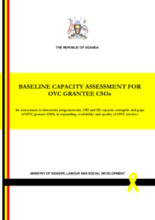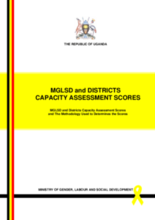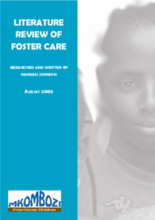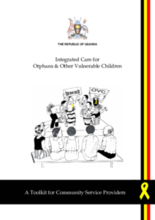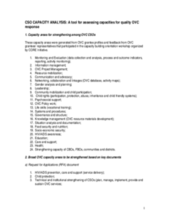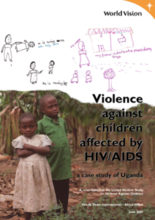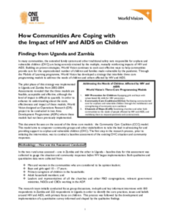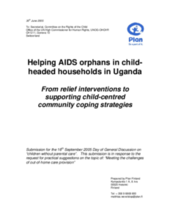This country page features an interactive, icon-based data dashboard providing a national-level overview of the status of children’s care and care reform efforts (a “Country Care Snapshot”), along with a list of resources and organizations in the country.
demographic_data
childrens_living_arrangement
children_living_without_bio
social_work_force
key_stakeholders
Key Stakeholders
Add New DataOther Relevant Reforms
Add New Datadrivers_of_institutionalisation
Drivers of Institutionaliziation
Add New Datakey_research_and_information
Key Data Sources
Add New DataThe Children Act (Uganda)
Country Care Review: Uganda
Prevalence and number of children living in institutional care: global, regional, and country estimates
The National Integrated Early Childhood Development Policy Action Plan (2016-2021) of Uganda
Catholic Care for Children in Uganda: A Family for Every Child - Findings from a Midterm Evaluation
Acknowledgements
Data for this country care snapshot was contributed by a consultant with the Data for Impact (D4I) Project at Palladium Group LLC.
Displaying 391 - 400 of 418
Findings and methodology of a capacity assessment of OVC Grantee CSOs in Uganda.
The methodology and tools used to score a capacity assessment to determine Uganda's MGLSD and district management capacity needs to provide leadership and coordination of the national response to OVC and AB/Y.
An assessment to determine MGLSD and District Management and operational capacity needs in providing leadership, coordination, and monitoring and evaluating the national response to OVC and AB/Y in Uganda.
This document sets out the thinking and plans regarding the use and management of Technical Service Organizations (TSOs) within the CORE Initiative project for the prevention of OVC and HIV among youth in Uganda.
A brief overview of foster care practice in the UK, Australia, South Africa, Uganda, and Tanzania. It includes information and lessons learnt on how caregivers are recruited and trained in these countries, how a child is placed, and how family support services are offered.
This Toolkit is a companion volume to the Ugandan Ministry of Gender Labour and Social Development’s OVC Training Manual. It contains practical information and tools to help Community Service Providers in Uganda translate the national OVC guidelines into action.
This document provides a tool that was used to assess broad capacity areas for quality OVC response in Uganda.
Report documenting participatory research conducted on violence against children affected by HIV/AIDS in Uganda. Particular focus on the stigmatisation and discrimination.
Assessment of pilot programs employing World Vision Community Care Coalition model in Uganda and Zambia.
Practical suggestions for supporting AIDS orphans in child-headed households based on experiences in Uganda. Includes lessons learned and key recommendations.

